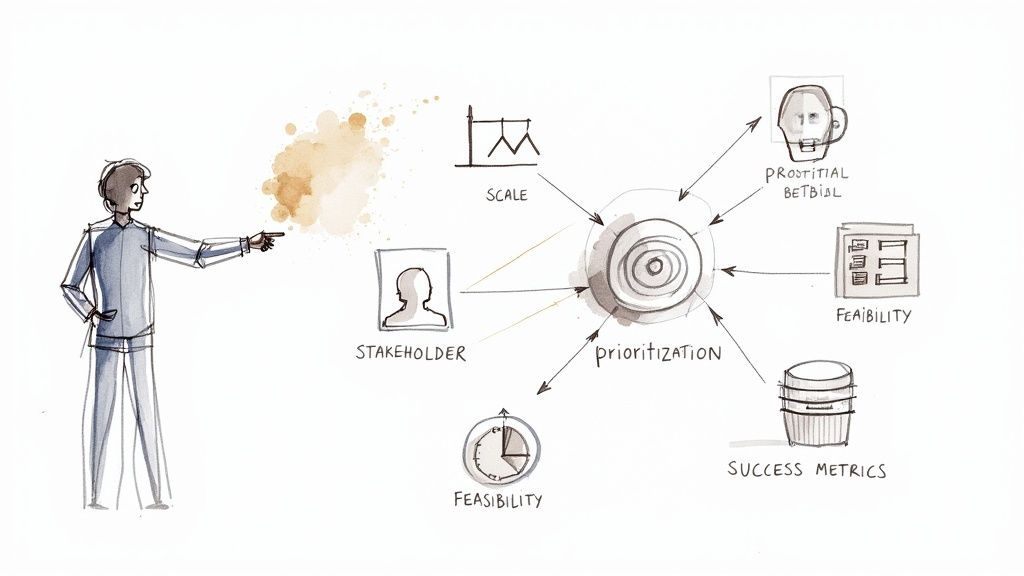Transforming MedTech with AI: A Strategic Roadmap
Explore how AI is revolutionizing the MedTech industry with a strategic roadmap for successful integration and transformation.

Embracing AI in the MedTech Industry: A Journey of Transformation
In the rapidly evolving landscape of medical technology, the integration of artificial intelligence (AI) is not just a trend—it's a revolution. As the MedTech industry stands on the brink of this transformation, the question is not whether to adopt AI, but how to do so effectively. This journey requires a MedTech AI strategy, a clear AI implementation roadmap, and a commitment to innovation.
The Roadmap to AI Success
To successfully integrate AI into MedTech, companies must treat AI projects with the same rigor as regulated products. This means maintaining risk logs, validation protocols, and clear AI governance in MedTech. By doing so, organizations can navigate the complexities of AI implementation with fewer setbacks and greater success.
Phase 1: Internal Pilots (0–6 months)
The journey begins with internal pilots, focusing on low-risk, high-impact use cases. Imagine a scenario where a MedTech company uses AI for predictive maintenance on existing equipment or employs AI-based quality inspection on a single production line. These AI pilot phases, led by a small cross-functional team, aim to deliver a Minimum Viable Product (MVP) quickly. By leveraging established machine learning frameworks or cloud tools, companies can accelerate development while ensuring compliance with existing standards like 21 CFR Part 11 and ISO 13485. Early wins in this phase are crucial for building momentum and securing leadership buy-in.
Phase 2: External Pilots (6–12 months)
Once internal pilots demonstrate value, the next step is to pilot AI with external stakeholders. Consider integrating an AI tool into a clinical workflow at a partner hospital or deploying a patient engagement chatbot on digital channels. These pilots should be treated like mini product launches, complete with defined clinical endpoints and real-world feedback collection. Involving compliance and legal teams early is essential, especially when negotiating data-sharing agreements under HIPAA compliance. This phase aligns with typical AI in medical technology clinical validation studies, allowing for iterative refinement.
Phase 3: Scale and Optimize (>12 months)
With successful pilots under their belt, companies can plan for broader deployment. This involves industrializing the solution through robust software engineering (MLOps) for stability and integrating with enterprise systems like PLM, ERP, and CRM. Establishing an AI Center of Excellence or a formal AI governance in MedTech board is crucial for overseeing deployment standards, data policies, and performance tracking. As the solution scales, change management becomes vital, necessitating training programs and communication plans for stakeholders.
Building the Foundation: Talent and Infrastructure
The success of AI in medical technology hinges on the right talent and infrastructure. Interdisciplinary teams comprising data scientists, ML engineers, software engineers, and domain experts are essential. Given the shortage of expert talent, companies may need to partner with specialized consultancies or leverage academic collaborations. On the infrastructure front, scalable computing, data storage, and integration with IoT/sensors are critical. MedTech IT must ensure that infrastructure supports high-throughput analytics and secure data pipelines.
Measuring Success: Metrics and Feedback Loops
Defining success metrics early is vital. Key performance indicators (KPIs) might include product accuracy, manufacturing yield improvement, and patient engagement rates. Intangible metrics, such as clinician time saved and innovation pipeline growth, should also be tracked. Successful pilots should feed into a broader MedTech AI strategy, with continuous monitoring and feedback loops to ensure ongoing improvement.
Conclusion: A Transformational Opportunity
AI presents a transformational opportunity for MedTech companies, promising improvements in innovation speed, product quality, patient outcomes, and operational efficiency. To seize this opportunity, organizations must enable AI at multiple levels, with senior leadership visibly championing AI initiatives. By embedding AI into their long-term plans and aligning it with a clear MedTech AI strategy, firms can unlock significant growth and redefine medical technology in the next decade.
Our in-depth strategy reports reveal how AI is already cutting costs, boosting efficiency, and driving revenue growth across sectors. Just drop your email to get instant access.



